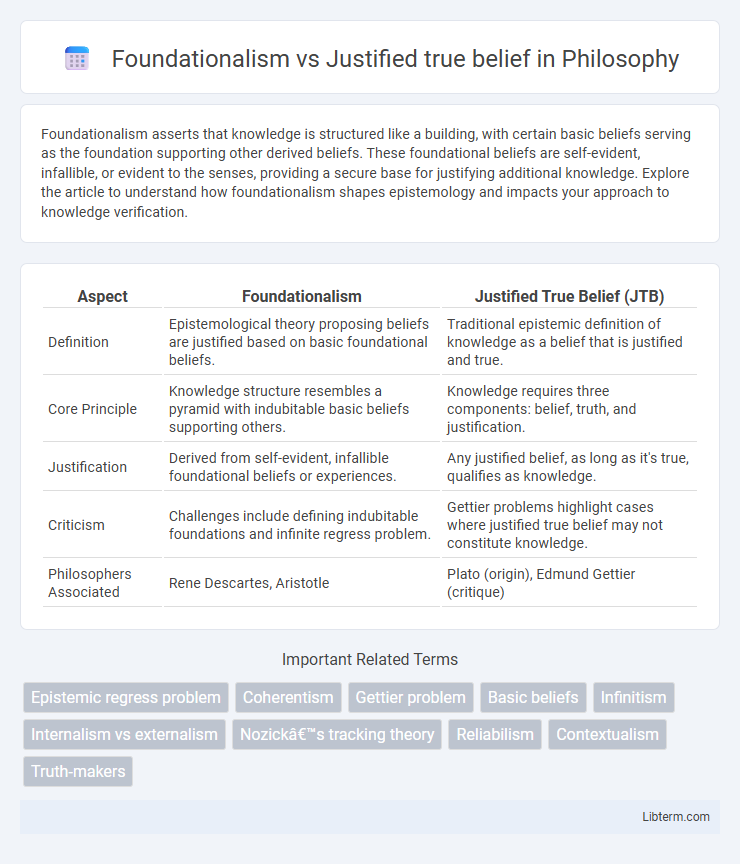Foundationalism asserts that knowledge is structured like a building, with certain basic beliefs serving as the foundation supporting other derived beliefs. These foundational beliefs are self-evident, infallible, or evident to the senses, providing a secure base for justifying additional knowledge. Explore the article to understand how foundationalism shapes epistemology and impacts your approach to knowledge verification.
Table of Comparison
| Aspect | Foundationalism | Justified True Belief (JTB) |
|---|---|---|
| Definition | Epistemological theory proposing beliefs are justified based on basic foundational beliefs. | Traditional epistemic definition of knowledge as a belief that is justified and true. |
| Core Principle | Knowledge structure resembles a pyramid with indubitable basic beliefs supporting others. | Knowledge requires three components: belief, truth, and justification. |
| Justification | Derived from self-evident, infallible foundational beliefs or experiences. | Any justified belief, as long as it's true, qualifies as knowledge. |
| Criticism | Challenges include defining indubitable foundations and infinite regress problem. | Gettier problems highlight cases where justified true belief may not constitute knowledge. |
| Philosophers Associated | Rene Descartes, Aristotle | Plato (origin), Edmund Gettier (critique) |
Introduction to Epistemology
Foundationalism asserts that knowledge is structured upon basic beliefs that are self-evident or infallible, forming an indubitable foundation for all other beliefs. In contrast, the concept of justified true belief defines knowledge as a belief that is both true and supported by sufficient evidence or justification, emphasizing the tripartite criteria of truth, belief, and justification. These frameworks are central to Introduction to Epistemology, addressing how knowledge is acquired, validated, and distinguished from mere opinion.
Defining Foundationalism
Foundationalism is an epistemological theory positing that knowledge and justified beliefs rest on a base of self-evident or indubitable foundational beliefs, which provide the ultimate justification for all other beliefs. These foundational beliefs are believed to be infallible or evident without the need for further support, forming a secure foundation for the structure of knowledge. In contrast, the concept of justified true belief (JTB) defines knowledge as beliefs that are not only true but also justified, without necessarily requiring an infallible foundation.
Understanding Justified True Belief (JTB)
Understanding Justified True Belief (JTB) involves recognizing it as a traditional epistemological theory positing that knowledge consists of beliefs that are both true and justified. JTB requires that a belief is supported by evidence or reasons sufficient to confirm its truth, thus distinguishing knowledge from mere opinion. This theory faces challenges like the Gettier problem, which exposes cases where justified true belief may still fail to constitute knowledge.
Historical Origins of Foundationalism
Foundationalism traces its historical origins to ancient Greek philosophy, particularly Aristotle's theory of knowledge, which emphasized basic self-evident truths as the foundation for building further knowledge. This epistemological approach was further developed during the early modern period by philosophers such as Rene Descartes, who sought indubitable beliefs to serve as undeniable foundations for scientific knowledge. Foundationalism contrasts with the concept of justified true belief by stressing that certain beliefs must be inherently justified to support the reliability and structure of all subsequent knowledge claims.
Core Principles of Justified True Belief
Justified True Belief (JTB) theory asserts that for a belief to constitute knowledge, it must be true, the individual must believe it, and there must be sufficient justification supporting that belief. Core principles include the necessity of evidence or rational support for the belief, ensuring reliability and minimizing error or guesswork. This framework contrasts with foundationalism's emphasis on basic beliefs as the ultimate justification source, highlighting JTB's reliance on external truth and internal justification alignment.
Key Differences Between Foundationalism and JTB
Foundationalism asserts that knowledge is structured like a building, resting on basic beliefs that are self-evident or indubitable, while Justified True Belief (JTB) defines knowledge as belief that is both true and justified. Foundationalism emphasizes the importance of indubitable foundations to avoid infinite regress in justification, whereas JTB focuses on the tripartite conditions without explicitly addressing the source or structure of justification. Key differences lie in Foundationalism's hierarchical model of justification contrasted with JTB's more general criteria for what constitutes knowledge.
Philosophical Challenges to Foundationalism
Philosophical challenges to foundationalism primarily arise from the problem of the infinite regress of justification, questioning whether basic beliefs can truly be self-evident, incorrigible, or evident to the senses. Critics argue that foundational beliefs may not provide the secure, indubitable basis required, leading to potential circularity or arbitrariness in epistemic structures. Furthermore, the challenge of the Gettier problem exposes limitations in equating justified true belief with knowledge, complicating foundationalist efforts to establish certainty.
The Gettier Problem and Its Impact on JTB
The Gettier Problem challenges the traditional Justified True Belief (JTB) theory by presenting cases where beliefs are justified and true yet fail to constitute knowledge due to luck or coincidence. This problem exposes foundationalism's limits, which relies on basic, indubitable beliefs as the basis for knowledge, by demonstrating that justification alone cannot guarantee truth. Consequently, the Gettier Problem has spurred epistemologists to refine or replace the JTB framework to better address the complexities of knowledge acquisition.
Contemporary Debates in Epistemology
Contemporary debates in epistemology critically examine Foundationalism and the Justified True Belief (JTB) account of knowledge, questioning the reliability and structure of belief justification. Foundationalism asserts that knowledge rests on basic, self-evident beliefs, while challenges to JTB highlight issues like Gettier problems that undermine the sufficiency of justification, truth, and belief for knowledge. Modern epistemologists explore alternatives such as coherentism and reliabilism, aiming to resolve tensions between foundational beliefs and the dynamic, context-dependent nature of justification.
Conclusion: Implications for Theories of Knowledge
Foundationalism posits that knowledge is built upon basic, self-evident beliefs, whereas Justified True Belief (JTB) defines knowledge as beliefs that are true and supported by justification. The divergence between these theories highlights the challenge of securing indubitable foundations while ensuring justification meets truth criteria. This tension influences contemporary epistemology by shaping debates on the structure and criteria of knowledge acquisition and validation.
Foundationalism Infographic

 libterm.com
libterm.com